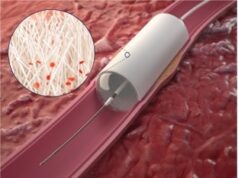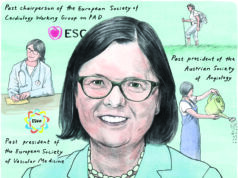
Recognising that new technologies and techniques are revolutionising how venous disorders are treated, in 2014, for the first time, the Charing Cross Symposium (5–8 April, London, UK) will host three days of venous activities. This year, the CX Office-based Vein Practice Course has been extended over two full days—Sunday and Monday—and will be followed by a day of venous talks in the Venous Consensus Update session of the Main Programme on Tuesday.
“The CX Office-based Vein Practice Course is unlike any other venous meeting. It aims to cover all aspects of venous disorders and treatment in small-groups and 1-on-1 discussion with colleagues and experts in the field,” said Ian Franklin, Imperial College London, UK, and course director. “The format is flexible rather than a rigid programme. Multiple training stations are provided, each dedicated to a particular subject and each one led by a renowned expert in that area. The stations are laid out like car stands in a motor show. You can spend as long as you like in the stations that interest you and pass by the ones you are already familiar with.”
This year, Alun Davies, Imperial College, London, UK, and Mark Whiteley, Whiteley Clinic, Guildford, UK, have joined the CX Office-based Vein Practice Course team.
The Sunday will have a strong emphasis on practical skills with simulators and equipment to learn ultrasound-guided cannulation, catheter positioning and tumescent anaesthesia. Other stations will include: virtual ultrasound training with the Axiom simulator; deep vein thrombosis interventions including Trellis, Angiojet, suction thrombectomy and Ekos; leg ulcers and skin grafting under local anaesthetic; steam thermotherapy; CHIVA; ambulatory phlebectomy; deep vein thrombosis prophylaxis in the thrombophilic patient; microsclerotherapy for thread veins; Norseld laser treatment for thread veins; and marketing and social media for doctors.
The Monday will include diagnostic ultrasound training; lymphoedema and compression therapy; foam sclerotherapy; microsclerotherapy for thread veins; ASVAL; pin stripping under local anaesthetic, Norseld laser for thread veins; surgical deep vein reconstruction; deep venous stenting; endovenous valves; pelvic vein treatments and pelvic congestion syndrome; case presentations; and website design and search engine optimisation for doctors.
On both Sunday and Monday techniques for endovenous ablation will be showcased. These will include Venefit (formerly known as VNUS ClosureFAST); Biolitec EVLT; Angiodynamics EVLT; Vascular Solutions EVLT; EVRF; Olympus RFiTT; Clarivein mechanochemoablation; and Sapheon Venaseal endovenous glue.
On Tuesday, delegates will hear a full day of talks in the Venous Consensus Update session as part of the Main Programme. Some of the highlights are the new NICE guidelines on the treatment of varicose veins. Last year, NICE stated that varicose vein patients in the UK should be offered endovenous ablation as a first-line treatment. This will be followed by sessions on venous imaging, varicose vein treatment, deep venous thrombosis and chronic deep venous disease.
CX 2014
Grand Hall, Olympia
London, UK
5–8 April 2014













